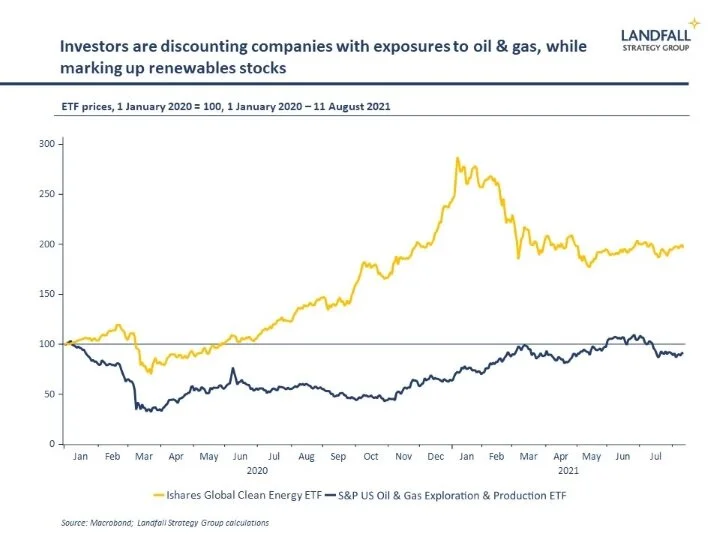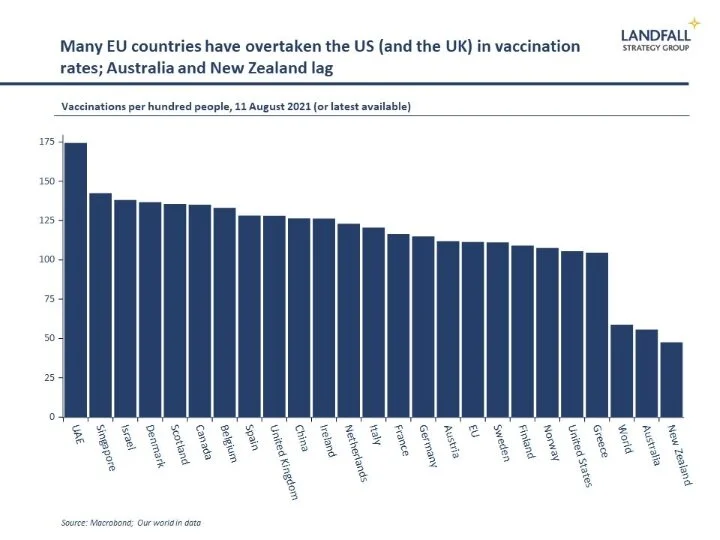On Covid & climate change
You can subscribe to receive these notes by email here
I am just back from a vacation in Greece that, although wonderful, felt a bit like it was at the centre of the world’s crises. Although Greece has done a good job in managing Covid and in rolling out vaccines, cases are rising again.
And Greece and other parts of southern Europe are suffering devastating fires on the back of record heatwaves across the region. These exposures to a changing climate are expected to get worse.
Indeed, in a week in which global Covid cases and deaths continued to rise, the IPCC released its latest report – starkly warning that the world is on a path to exceed temperature increases of 1.5 degrees by 2040, and that we are fast running out of time to respond.
Source: IPCC, August 2021
Although there are clear differences in scale and complexity between the Covid and climate change crises, the Covid experience provides perspectives into the likely shape of the climate change response.
Multilateralism is tough
Despite the global nature of Covid, most of the action in controlling the spread of Covid, rolling out vaccines, and developing economic responses has been at national or regional (EU) level. The WHO and other multilateral organisations have had a relatively limited role – and there has been relatively limited international sharing of vaccines or financial aid relative to the need.
Covid has reminded that all (or most) politics is local – with nation states taking the lead role.
To a much greater extent, global climate change requires a genuinely multilateral response – with countries (particularly the large emitters) making ambitious and enforceable commitments. Progress has been made, and more will be made at the COP26 meetings in Glasgow in November. But gaps between the required ambition and likely commitments remain wide.
Although second best, the reality is that lot of the action will take place at national level. Some countries are actively positioning themselves for a lower emissions world. And there is some competitive pressure to respond: both China and the EU, for example, are investing heavily in renewables.
And many firms are responding to changing consumer and investor preferences, even without legislative requirements. Investors are increasingly discounting emissions intensive activity.
Innovation to the rescue
The return to something approaching pre-Covid economic and social normality (in advanced economies) has happened much more quickly than expected because of the remarkable speed in developing effective vaccines. Without this innovation, Covid would have imposed a much larger health and economic cost.
Substantial innovation will also be needed to effectively respond to global climate change, from transforming energy systems to new modes of transport and construction. Innovation in renewable energy has been remarkable over the past decades, with unit costs of solar and wind power dropping substantially and the penetration of EVs increasing sharply.
Investing in innovation – and deployment – is critical by both governments and companies. The Covid experience is that we may be positively surprised by the scale and speed of innovation.
The world is not flat
Covid performance across countries in economic and health outcomes has varied widely, both within the developed world – and even more so between developed and developing countries. From India to parts of South East Asia and Africa, cases and deaths in the developing world have been very high – and with less ability to buffer the economic cost than in advanced economies.
This variation in performance has led to restrictions on flows of people between different parts of the world, as well as pressure on global supply chains.
Broadly speaking, climate change is expected to have a relatively large impact on developing countries – both directly (droughts, floods, rising sea levels, etc) and because these countries have limited financial capabilities to respond.
Source: IPCC, August 2021
There will be huge issues of global equity (as well as self interest by richer countries) to ensure that all are able to respond. Much more will need to be done than has been the case.
And as with Covid, the climate change response is likely to reinforce fragmentation of the global system (note the EU’s proposed carbon border tax).
k-shaped distributional impact
The economic and health impact of Covid has varied widely across the population, frequently reinforcing existing inequalities (labour markets under pressure, while asset prices have soared). This has been partly offset (in advanced economies) by unprecedented government support.
The response to climate change will also create pressure on the distribution of outcomes. For example, pricing emissions is expected to have a disproportionate impact on lower income groups. Higher fuel prices have already led to political pressure in countries like France, and more can be expected.
To ensure that an aggressive climate change policy response can be sustained, governments will need to be deliberate and targeted in responding to these distributional impacts. If not, political support for climate change action may be withdrawn.
National characteristics matter
There has been much commentary on the factors explaining national variation in Covid performance (democracy v autocracy and so on). My assessment is that states with higher quality political and social institutions (effective governance, social capital, trust) did better than those without.
These institutional characteristics had more explanatory power than measures of pandemic readiness, as I have noted before. This is one reason why small advanced economies, from Singapore and New Zealand to Finland, have done relatively well in managing Covid.
Countries with institutional strength will also likely be better placed to manage the impact of climate change, and to set appropriate policy. In particular, governments will need to be able to set long-term policy and to develop political and social consensus around the strategic direction. The sustained pressures of climate change will be demanding on state capability and social cohesion – and countries should be strengthening these institutions where they can.
Building back better
Lessons need to be learned from Covid to enable future pandemics to be better managed. But this experience can also be seen as a partial test run for managing through climate change, a much more challenging (and long-lasting) shock.
Parts of the Covid response have been good, other parts very ordinary.
One positive element is that Covid has provided the foundation for a partial reset of policies and institutions. Green initiatives are a core part of the economic recovery packages in the EU, the US, and elsewhere. There is an apparent willingness to invest more aggressively in the future, and growing pressure on emissions intensive industries.
But global climate change will require a much better worldwide response than during Covid.
Get in touch if you would like to discuss this analysis and its implications. I am also available for presentations and discussions on other global economic and political dynamics, and the implications for policymakers, firms, and investors. Do let me know if your organisation is interested in arranging a discussion.
Chart of the week
Vaccinations are proceeding well in Europe, with many European countries now close to the top of the vaccinations per capita ranking. The EU has overtaken the US for the number of vaccinations, allowing for a more confident reopening process. Israel and the UAE continue to top the tables, although Israel is now battling an outbreak of cases. Australia and New Zealand are still towards the bottom of the rankings, which will slow the reopening of borders.
Around the world in small economies
Small economies had a good Olympic Games. New Zealand ranked 13th overall, with 20 medals (7 of which were gold), the Netherlands ranked 7th with 36 medals, and Switzerland won 13 medals. On a per capita basis, small economies dominated the medal rankings. Even San Marino (population 30,000) won 3 medals.
Singapore’s GDP growth forecast for 2021 was marked up to 6-7% from 4-6%, supported by a rapid vaccination programme and robust external demand.
In his speech to mark Singapore’s National Day, Prime Minister Lee announced plans to adjust policies on the number and type of foreign workers – as well as reflected on Singapore’s Covid experience. However, Singapore remains a highly attractive investment location: foreign buyers are driving a real estate boom in premium properties.
Taiwan’s export growth continues to exceed expectations, up 35% in the year to July on very strong demand for semiconductors and other electronics.
The Swiss franc has appreciated to multi-month highs on its safe haven properties. But central bank intervention to take this pressure off seems unlikely for the moment.
New Zealand Prime Minister Ardern made announcements on Thursday on the approach to re-opening New Zealand’s borders. It will be a gradual process, largely occurring from 2022, contingent on high levels of domestic vaccination – and continuing to follow an elimination approach to Covid.
Greek international tourism inflows are getting close to their 2019 levels, after a badly impacted 2020 tourism season.
Dr David Skilling
Director, Landfall Strategy Group
www.landfallstrategy.com
www.twitter.com/dskilling




